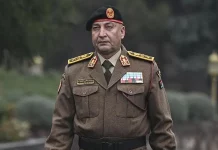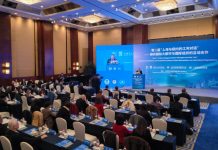| Supreme Court declares National Assembly Speaker’s ruling unconstitutional | Orders President to convene NA Session tomorrow | Voting on no-confidence motion to be held not later than 10:30am on Saturday at 10am | Opposition celebrates SC ruling, govt terms verdict ‘unfortunate’ | Maryam sees Uncle Shehbaz as Prime Minister | Chief Justice orders political parties to settle matter on their own | Fazal says Opposition to observe ‘Youm e Tashakkur’ today
By Asghar Ali Mubarak
ISLAMABAD: The Supreme Court of Pakistan restored the National Assembly Thursday after it declared the government’s decision to dissolve the assembly and NA Deputy Speaker Qasim Suri’s ruling against the Constitution.
The top court has ordered National Assembly Speaker Asad Qasier to summon the session on Saturday (April 9) and not later than 10:30am to allow the vote on the no-confidence motion against the premier.
“In consequence of the foregoing, it is declared that at all material times the Prime Minister was under the bar imposed by the Explanation to clause (1) of Article 58 of the Constitution and continues to remain so restricted. He could not, therefore, have at any time advised the President to dissolve the Assembly as contemplated by clause (1) of Article 58,” the court’s order read.
“In consequence of the foregoing, it is declared that the advice tendered by the Prime Minister on or about 03.04.2022 to the President to dissolve the Assembly was contrary to the Constitution and of no legal effect,” said the order.
The Supreme Court also “declared that the assembly was in existence at all times, and continues to remain and be so”.
The apex court also stated that the speaker cannot prorogue the assembly and bring the session to an end if the no-trust motion fails or after a new prime minister is elected if a no-confidence motion is passed.
The court ruled that no member will be barred from casting their vote. It also stated that if the no-trust motion fails then the government will continue to carry out its affairs.
“If the no-confidence motion against the prime minister succeeds, then the assembly will appoint the new prime minister,” the top court’s order said.
Chief Justice of Pakistan Umar Ata Bandial had earlier said that the court will move forward only after seeing national interest and practical possibilities.
The chief justice had noted that the deputy speaker’s ruling is, prima facie, a violation of Article 95, as the apex court resumed deliberation over the “unconstitutional” act by Suri for the fifth consecutive day.
The apex court’s five-member larger bench — headed by Justice Bandial and comprising Justice Muneeb Akhtar, Justice Aijazul Ahsan, Justice Mazhar Alam, and Justice Jamal Khan Mandokhel — heard the case and then later issued the ruling.
“The parties of the case should settle the matter on their own through mutual consultation,” CJP Bandial remarked.
Giving his arguments, Barrister Zafar said that proceedings of both Houses of Parliament have separate privileges.
CJP Bandial asked if the NA proceedings did not have an effect on the situation outside of Parliament in this case.
“The court can intervene if any action has an effect outside Parliament,” the CJP remarked.
Meanwhile, Justice Alam inquired if any unconstitutional act in Parliament has constitutional immunity.
Whereas, Justice Mandokhel asked if there isn’t any solution if an unconstitutional act takes place in Parliament.
At this, Barrister Zafar replied that Parliament has to solve the issue and the solution is to go to the people [election].
Referring to a past judgement, Zafar said that a member in the House of Commons wasn’t allowed to take oath as the court declared that it cannot interfere.
At this, CJP Bandial asked what should be done if there is injustice in Parliament.
“Is the formation of federal government an internal affair of Parliament?” he asked.
In his response, Barrister Zafar said that the election of a prime minister or a no-confidence motion “is an internal affair of Parliament.”
“The NA is constituted to elect its speaker and prime minister. However, the court can review the formation of federal government and dissolution of assembly” he added.
At this CJP Bandial said that it would have been determined who will be the premier had the vote of no confidence against PM Imran Khan held.
Talking to media personnel, Opposition Leader in the National Assembly Shahbaz Sharif said the top court’s decision was in line with the expectations of the masses.
“The Constitution has been saved and Pakistan has been saved through this decision the court has upheld its independence and respect,” the Opposition leader said.
He thanked the top court for its unanimous decision to strengthen the parliament and its sovereignty.
“We will no fight the battles of economy and politics for the people.”
Akin to that, PML-N Vice President Maryam Nawaz took to the microblogging website and expressed her gratitude to God for the Opposition’s win.
“I congratulate the nation as the supremacy of the Constitution has been restored,” she wrote. “Those who had violated the Constitution are done away with. May Allah keep Pakistan shining.
She also hailed her uncle, PML-N President Shahbaz Sharif, and wrote that he would be the next premier.
Reacting to the decision of the top court, PPP Chairman Bilawal Bhutto-Zardari took to Twitter and celebrated the Opposition’s win by writing: “Democracy is the best revenge.”
Speaking to journalists along with Shahbaz, JUI-F chief Fazlur Rehman congratulated the nation and said that the decision of the SC was a win for the country’s Constitution.
Fazl announced that the Opposition will be observing a day of gratefulness “Youm e Tashakkur’ today (Friday).
“May Allah help us steer this country out of the economic turmoil,” he said.
Reacting to the decision of the Supreme Court, the Minister for Information and Broadcasting Fawad Chaudhry expressed his regret and disappointment, terming the verdict “unfortunate”.
Taking to Twitter, he wrote: “This unfortunate decision has exacerbated the political crisis in Pakistan. Immediate elections could have brought stability to the country. Unfortunately, the importance of the people has been overlooked. Let’s see how things go now.”




